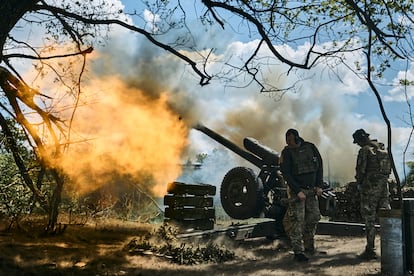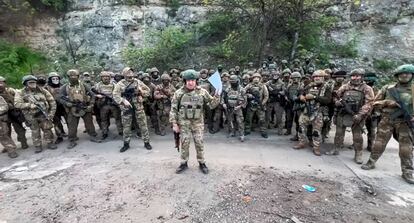Russia on edge as Ukrainian gains spread fears over imminent counteroffensive
Moscow acknowledges having withdrawn its troops on one flank in Bakhmut while rumors abound on social media of Kyiv’s forces advancing and even preparing to cross the border


Shortly after nightfall in Moscow on Thursday, Russian social networks started firing alerts like a machine gun on the front lines. Pro-Russian bloggers claimed that the Ukrainian Army had just launched its long-awaited counteroffensive and was now bearing down on the Kremlin’s forces on all fronts: crossing the Dnipro River to advance into Crimea and forming a pocket in Bakhmut, capturing thousands of Russian soldiers, while attacking the neighboring town of Soledar and even preparing to cross the border — the Kremlin’s ultimate red line — to conquer the Russian region of Belgorod. “Statements spread by individual Telegram channels about defense breaches that took place on various parts of the contact line do not correspond to reality,” the Russian Defense Ministry stated at around midnight.
On Friday morning, the head of the mercenary Wagner Group, Yevgeny Prigozhin, rubbished the official line and hours later the Russian military euphemistically acknowledged having “regrouped” in Bakhmut, the devastated city that has become the epicenter of the war and where the Wagner Group has borne the brunt of the fighting on a front that Ukraine has vowed will not fall.
One of the first signs of panic came from Russia’s northern border with Ukraine. “On the Internet rumors have begun to spread that troops of the Ukrainian Armed Forces are heading towards Belgorod from the Kharkiv region. We hasten to point out that this information does not correspond to reality. Ukrainian vehicles are only moving inside Kharkiv, no offensive is planned,” local news channel Dzhest Belgorod reported in response to speculation that Ukrainian forces were about to arrive at the gates of the city. However, the rumors pointed only to a build-up of forces in the vicinity, not to an attack being staged.
Information on the situation at the front is often contradictory and difficult to verify in Russia. The Defense Ministry claims to have halted an assault on a 60-mile front around Soledar, a city near Bakhmut in the Donetsk region, which it said was staged by 1,000 Ukrainian soldiers with support from 40 armored vehicles. Kyiv, meanwhile, offered a completely different version of events. Ukrainian President Volodymyr Zelenskiy stated that Ukrainian forces in the area were attacked and not only managed to stop them, but in some cases “pushed them back.”
Zelenskiy reiterated Thursday that Ukrainian forces need “a bit more time” to prepare for the counteroffensive and the wait is becoming an uncomfortable one in Moscow. Tensions between the Russian High Command and the Wagner mercenaries were further strained on Friday when Prigozhin rebuffed a victorious Defense Ministry report on the situation in Bakhmut and ironically questioned the military ability of its chief, Sergei Shoigu. This latest verbal battle was won by Prigozhin: a few hours later, Moscow acknowledged with opaque wording that it had yielded ground to a Ukrainian advance.
“On the flanks of PMC Wagner, where Russian Federation Armed Forces units are located, the enemy has launched a number of successful counterattacks,” Prigozhin wrote on Telegram the morning after the Defense Ministry claimed to have repulsed three Ukrainian attacks in the disputed city. Hours later, Defense Ministry spokesman Igor Konashenkov clarified that the troops supposedly covering the Wagner Group’s flanks on that front had “regrouped.” Earlier in the week, the Wagner Group commander accused a Russian brigade of having “fled” the battlefield.
“Units of the Russian Southern Group have occupied another line on the Maloilinovsk front because of favorable conditions provided by the Berekhovskoye reservoir. They proved their courage in repulsing the enemy’s attacks,” Konashenkov said. Prighozin challenged the Defense Ministry version and promised to provide more details at a later date. “Unfortunately, this is called a retreat, not a regrouping.”
Prigozhin has become an outspoken critic of the military high command, recently going as far as calling Shoigu and Chief of the General Staff Valery Gerasimov “bitches” for allegedly failing to provide his forces with ammunition. “Taking into account the difficult operational situation, as well as your many years of experience in combat operations, I ask you to come to Bakhmut and independently assess the current situation,” Prigozhin told Shoigu, with a not-too-veiled criticism of the Defense Minister’s largely desk-bound military career. The former head of the Ministry of Emergency Situations, Shoigu was appointed to the Defense Ministry in 2012 by Vladimir Putin, a result of the blind loyalty he had shown since the 1990s when the now-president burst onto the Russian political scene.

“Panicking is death”
One of Russia’s most popular war analysis channels, the ultra-nationalist WarGonzo, which has 1.3 million followers, has criticized those who showed fear at what appeared to be the start of the Ukrainian counteroffensive, as well as those who dismissed Thursday’s attacks as relatively small. “Panicking is death,” warned one of the Telegram page’s founders, Semyon Pegov, while urging Russian to take the latest movements on the front lines “seriously.”
“The enemy is making progress. In some places more, in some places less, but it will have an impact on the further development of events. The offensive did not start today, or yesterday; the enemy is looking for our weak points to try and hit them,” Pegov said Thursday.
The entire front stretches across a line of around 620 miles and the Russian high command is faced with the dilemma of which areas to reinforce with its worn-out troops in the face of the imminent Ukrainian offensive, while Kyiv in turn is attempting to sow more doubt in Moscow by probing Russian defenses at various points. Igor Girkin, the former Russian Federal Security Service officer who was one of the commanders who led Russian servicemen into Donbas in 2014, has also joined the speculation.
“I have predicted that the main offensive will be in Zaporizhzhia — Russia’s only land connection to Crimea — with auxiliary attacks in Kherson and possibly Donetsk. And they may inflict diversionary attacks in [the Russian regions of] Belgorod, Kursk, and Bryansk to capture settlements and provoke the Russian Armed Forces to try and retake them,” Girkin, one of the most outspoken critics of the Kremlin’s handling of the war, said. “It would make me happy to be wrong, but I am not very optimistic.”
While Russian troops are digging in along a vast defensive line, in the rearguard the search for fresh reinforcements is ongoing as the Kremlin seeks to avoid a new forced mobilization. The governor of the Primorye region in Russia’s far east, Oleg Kozhemyako, has presented a new “law on support for the participants of the special operation.” Under the law, the authorities will give priority for housing to orphans who sign up as volunteers. Russian legislation stipulates that the government must provide a roof over their heads when they turn 18, but there are currently some 288,000 orphans on the waiting list.
Sign up for our weekly newsletter to get more English-language news coverage from EL PAÍS USA Edition
Tu suscripción se está usando en otro dispositivo
¿Quieres añadir otro usuario a tu suscripción?
Si continúas leyendo en este dispositivo, no se podrá leer en el otro.
FlechaTu suscripción se está usando en otro dispositivo y solo puedes acceder a EL PAÍS desde un dispositivo a la vez.
Si quieres compartir tu cuenta, cambia tu suscripción a la modalidad Premium, así podrás añadir otro usuario. Cada uno accederá con su propia cuenta de email, lo que os permitirá personalizar vuestra experiencia en EL PAÍS.
¿Tienes una suscripción de empresa? Accede aquí para contratar más cuentas.
En el caso de no saber quién está usando tu cuenta, te recomendamos cambiar tu contraseña aquí.
Si decides continuar compartiendo tu cuenta, este mensaje se mostrará en tu dispositivo y en el de la otra persona que está usando tu cuenta de forma indefinida, afectando a tu experiencia de lectura. Puedes consultar aquí los términos y condiciones de la suscripción digital.








































